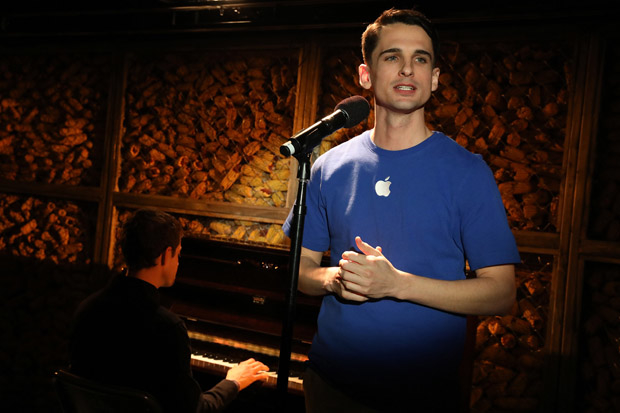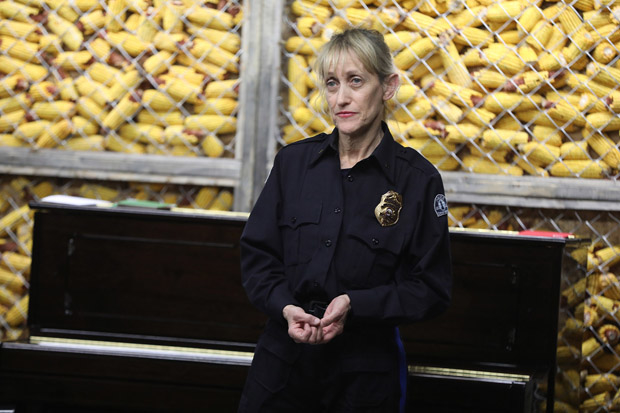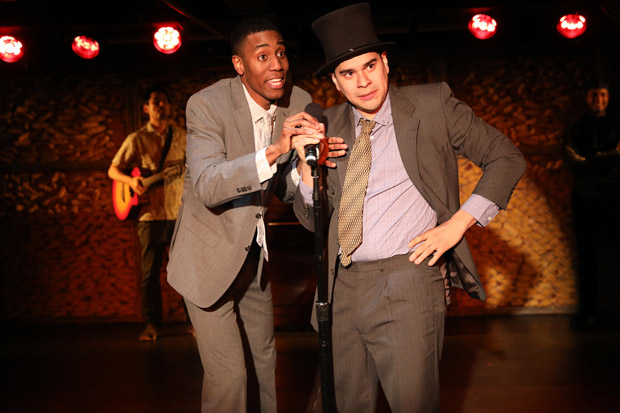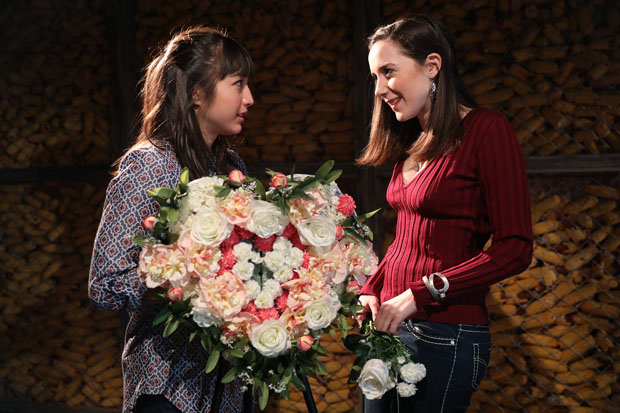Bobbie Clearly Through a Glass Darkly
Roundabout Underground hosts Alex Lubischer’s drama about an inexplicable act of violence in small-town Nebraska.

(© Joan Marcus)
Nikolas Cruz will never return to Marjory Stoneman Douglas High School to visit his old teachers. Dylann Roof will never bow his head in prayer with the congregation at Emmanuel AME Church. Dzhokhar Tsarnaev will never run in the Boston Marathon. So we spend much of Bobbie Clearly struggling to understand why the title character would want (or even be able) to move back to the small Nebraska community where he murdered one of his classmates.
Playwright Alex Lubischer presents this three-act drama as a live documentary, with the audience as filmmaker and confessor. After two-and-a-half hours of interviews and emotional exchanges in director Will Davis's in-the-round staging, we gain a panoramic view of the village of Milton (population 750), but we still aren't much closer to answering the elusive why that blows through this play like an insistent breeze rustling through a field of corn.

(© Joan Marcus)
A corn field is where Bobbie Clearly (Ethan Dubin) killed Casey Welch in front of her brother, Eddie (a guarded Tyler Lea). Bobbie was always a troubled kid, we learn from Officer Darla London (Constance Shulman, playing Milton's one cop with matter-of-fact melancholy). But he had a sensitive side according to his community outreach big bro Derek Nelson (J.D. Taylor, taking the "bro" part to heart). In the wake of the crime, the community creates the Casey G. Welch Foundation, a scholarship funded by an annual talent show. But tensions run high when Bobbie is released from custody and returns to Milton eight years later. It's one thing for him to move back, but it's a bridge too far when he insists on performing in the show.
The third act actually takes us into that event, in which Bobbie attempts to reintroduce himself to Milton in the creepiest way possible. This is where Lubischer's play jumps the rails, as contrivance and sensationalism overtake what was, up until now, a sensitive exploration of a difficult story. But even if you scoff at the improbability of it all, you won't be able to avoid feeling embarrassed, shocked, and deeply uncomfortable.
Some of that has to do with our physical proximity to the performers. Davis has devised an incredibly intimate production, which places actors in front of us, but also lurking in the shadows behind us. Set designer Arnulfo Maldonado literally surrounds us with corn. Ears of them bulge from behind chain link fence around the perimeter of the room, holding back the maize deluge. Costume designer Ásta Bennie Hostetter and sound designer Palmer Hefferan transport us to Nebraska circa 2006 with authentic Midwestern styling and an undying devotion to '90s pop. Jen Schriever's subtly manipulative lighting maximizes the impact of the production in this cloistered space.

(© Joan Marcus)
None of it would work without emotionally vulnerable performances from the actors. Dubin delivers a particularly astounding portrayal of Bobbie. He never speaks a word for the first two-thirds of the play, but the sound of his footsteps behind your chair is enough to give you chills. This is despite his gaunt frame and sheepish smile. It seems impossible that this pale, scrawny kid could kill anyone — but we know he did.
Lubischer's most insightful scenes don't feature Bobbie at all. Casey's mom (a marvelously fraught Crystal Finn) seems to be in total denial, while her hunter father (a menacingly stoic Christopher Innvar) responds by calmly disemboweling a deer. We all grieve in our own ways.
The interplay between talent show hosts Mitch (Brian Quijada) and Pete (Gabriel Brown) make us wonder if this charity event isn't just an excuse to showboat. The same goes for competitive dancers Megan (Talene Monahon) and Meghan (Sasha Diamond). The former thinks of Casey's death as the worst thing that ever happened to her, leading the latter to gently rebuke, "It didn't happen to you." Are these displays of public mourning just self-serving opportunities to solidify our reputations as good, caring, compassionate people? Derek is up-front about his view that helping Bobbie return to the flock is a chance to exhibit "pure Christianity."

(© Joan Marcus)
Like the recently opened The Lucky Ones, Bobbie Clearly probes the limits of our forgiveness. But unlike that musical, which couches its central act of violence in mythology and mental illness, Bobbie Clearly offers no explanation of why this terrible thing happened. We never really get to see Bobbie clearly, which feels simultaneously less satisfying and more truthful. Lubischer quietly suggests that instead of asking why following a senseless act of violence, we ought to be asking what do we do now?









